Calm in the chaos: Grace Shipway’s Sydney to Hobart story
Grace Shipway is a senior property manager at Charter Hall. But when she’s out of the office, she’s a tenacious sailor facing the most brutal waves. And this is no metaphor – it’s raw, open-ocean reality.
Grace recently completed the Rolex Sydney to Hobart Yacht Race, one of Australia’s most demanding sporting events. After four gruelling days offshore, she steered her boat, Love & War, across the finish line.
We sat down with Grace to hear her story – and discover what she’s learned about performing under pressure.
A goal years in the making
Grace Shipway has been sailing since she was five, training with her father in Sydney Harbour.
For over two decades, she would watch as the Sydney to Hobart race began on Boxing Day. And every year, she’d think: One day, I’ll be in that race.
That one day finally came in 2025.
‘It was the 80th year of the race, so it’s a bit more of a spectacle,’ Grace recalls. ‘And I just thought, this year felt right. It was time for me to do it.’
But why this race in particular? Besides the fact that it’s one of the most iconic ocean races within the sailing community, Grace explains, it’s also one that her father had completed before. Thirty-one times.
‘My dad is a highly respected yachtsman himself, and he’s inspired me to do it. Plus, if he could do it 31 times, I’m sure I can at least do one.’
Then, after a short pause, Grace adds with a smile, ‘Though I’d love to beat his record!’

Preparing for the uncontrollable
From the moment she decided to do the race, Grace knew she had to go all in.
And that meant saying yes – repeatedly. To harbour racing. Coastal racing. Offshore races. Weekends. Afternoons after work. Any opportunity to get on as many boats as possible, in as many conditions as possible.
She also focused on physical endurance, not because it was mandatory, but because she wanted to be the best that she could be, physically and mentally. And that includes completing safety-at-sea and survival training.
‘Going into a race like this, you’re very aware there are elements you can’t control, like the wind and waves and swell,’ she says. ‘So you need to prepare for everything you can.’
Grace’s preparations spanned almost a year. But it was only on race day that they were told about the severe conditions expected in the first 48 hours.
Did she, at any point, doubt that she could do this?
‘I was pretty nervous,’ Grace admits, ‘but I was never wanting to pull out. If anything, it excited me, and I couldn’t wait to get on with it.’

Holding course under pressure
Once offshore, life on board Love & War ran on a strict rhythm: three hours on, three hours off. Sleep was fractured. Meals were often missed. The boat was constantly moving – pitching, rolling, demanding attention.
But the hardest moments came at night.
‘It’s dark, and you’re cold, wet and tired,’ Grace says. ‘You’re also sleep-deprived and sometimes seasick, out on the ocean with no other boats around you… just your thoughts.’
And yet, that was when Grace learned most about herself.
‘I was surprised by how calm I became,’ she reflects. ‘I was concerned that the chaos and challenging conditions would frighten me. Instead, I was able to put that to the side and focus on one thing: getting the boat to Hobart.’
That calm was reinforced by the crew around her – 10 other sailors with a combined Hobart experience of more than 150 races.
‘Knowing that I was in safe company eased a lot of those nerves,’ Grace says. ‘They never raised their voices, and were always patient and supportive. It was a very professional crew.’
By the end of the race, something had changed within Grace.
‘Going into it, I doubted myself and how much I really knew. But by the end, my confidence had grown. I realised I actually did have this. I had what it took to do the work.’

Performance over perception
Grace was the only woman on the crew – and the first female to ever sail on board Love & War. Did that bring its own set of pressure and expectations?
‘There was quite a bit of attention on the fact that I’m the first female on such a prestigious boat,’ Grace admits. ‘But once I started racing, for me it became more about competence and performance rather than gender.’
Grace was clear she didn’t want any special treatment. She didn’t want expectations lowered or language toned down. She just wanted business as usual and the focus on the race.
‘In offshore sailing, the ocean doesn’t really care about who you are. It only cares about the job performance. So it doesn’t matter whether you’re a woman or a man – you’ve just got to get from A to B.’
After 4 days, 1 hour and 15 minutes at sea, Love & War crossed the Hobart finish line, with Grace at the steering wheel. It was a significant moment, as her father had sailed the same boat to victory in the 1974 and 1978 races.
‘It’s a boat with extraordinary legacy,’ she tells us. ‘Being part of that – and contributing to it – is something I’m incredibly proud of.’

Offshore lessons, onshore impact
Grace approaches sailing the same way she approaches her career: with intention, planning and discipline.
Offshore racing sharpens decision making under pressure. It demands resilience. Reinforces the importance of teamwork and preparation. And rewards those who stay calm when conditions are at their worst.
‘These experiences feed into each other,’ Grace says, when asked about balancing her work and passion. ‘They make me better – onshore, offshore, and in everyday life.’
If there’s one belief that’s helped Grace succeed – both in the water and at work – what would it be?
Her answer came immediately.
‘You don’t have to feel 100% ready. You just have to be willing. Confidence isn’t something you wait for. It’s something you earn by showing up, doing the work, and staying when things get hard.’
Want to read more about inspiring women blazing trails in the industrial sector? Follow WIN on LinkedIn.
2025: The year WIN expanded reach and doubled down on development
2025 was a year where WIN showed up – and shifted conversations. Across classrooms, campuses and industrial sites, we created practical pathways and real opportunities for women to enter, stay and lead in the sector.
Here’s a look at the standout moments and milestones that shaped our year – and what’s coming next.
Professional development
In 2025, we doubled down on creating spaces for women to grow their skills, test new ideas and step into bigger conversations.
The intent? To lift capability and confidence at every career stage.
Think real-world exposure and real-time growth. And the appetite for learning was loud and clear – from emerging talent to seasoned professionals.
Through our programs, we delivered site tours and workshops, welcoming more than 220 women to these events.
What stood out:
- We delivered a hands-on workshop led by Peter Ferreira from E-Cue at GPT’s Sydney offices. This session helped attendees sharpen their influencing and negotiation skills and build practical strategies to speak and lead with authority.
- We hosted a site tour of Goodman’s mass timber development in Victoria, offering rare behind-the-scenes exposure to innovative and sustainable industrial design.
What we learned:
Interest in professional development isn’t predictable – or linear. We saw women at every level show up, from students and junior professionals to mid-career and senior industrial leaders.
What’s next:
Expect more site tours across landmark industrial developments. We’ll also offer more development opportunities that cater to every stage of career growth.

Schools and universities
This year, we entered classrooms, lecture theatres and expos to give students a clearer picture of what a career in industrial could look like.
We:
- Delivered a guest lecture at Melbourne University for undergraduate property students.
- Progressed conversations to secure long-term collaboration with RMIT, UNSW, Western Sydney University and The University of Melbourne.
- Ran a tailored workshop at UTS to help students explore industry opportunities.
We also built a central register of university contacts and careers calendars – creating a coordinated approach to student engagement for 2026 and beyond.
What stood out:
- We participated in Emmaus Catholic College’s Year 10 careers event to spark early interest in the industrial property pathway.
- We had our first-ever career expo stand at Bond University, a major visibility moment for WIN.
What we learned:
When it comes to engaging future talent, consistency and continuity are key.
We achieve stronger outcomes with coordinated efforts and clear communication, while thoughtful engagement approaches help maximise impact.
What’s next:
Expect stronger partnerships and more sponsored awards and guest speaking programs across universities and schools.
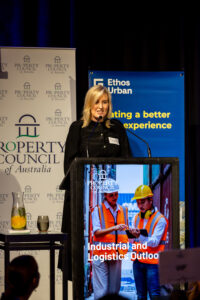
Agency
Our Agency sub-committee focused on refining our scholarship model and sharpening our selection process to create sustainable pathways for women.
We delivered the UTS 2025 Scholarship Program, presented to UTS Property Economics students, and explored more partnership opportunities with The University of Melbourne and RMIT.
What stood out:
- Our inaugural UTS Scholarship Program recipient, Isabella Anello, brought the program to life – adding visibility and credibility to our agency efforts.
- Our early conversations with The University of Melbourne and RMIT secured strong interest in deeper collaboration and future scholarship partnerships.
- We awarded 11 scholarships for the PCA Industrial and Supply Chain Diploma, supporting both emerging and experienced professionals.
What we learned:
Fine-tuning matters – especially when it comes to attracting the right talent.
By sharpening our scholarship selection process, we were able to better support candidates in building long-term agency careers.
It was a reminder that early, targeted engagement creates a stronger pipeline – and sets students up for enduring success in the sector.
What’s next:
The UTS 2026 Scholarship Program will kick off early in the year. Our University of Melbourne partnership is gaining traction, with contractual agreements expected in Q1. And plans are underway for our Annual Agency Lunch in early 2026.
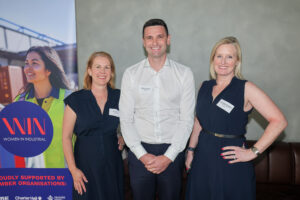
Networking
In 2025, we expanded our footprint, creating powerful moments of connection Australia-wide.
We trialled new venues and formats, and continued to build the kind of spaces for women to be seen, supported and professionally anchored.
And we’re happy to report that we saw strong, engaged attendance and a palpable sense of community at every WIN event.
What stood out:
- We held our first-ever Perth event! This milestone launch confirmed a clear appetite for WIN’s presence in WA.
- Brisbane hit its stride in year two, with standout attendance rates and enthusiasm from peers across the sector.
What we learned:
WIN’s presence and impact is growing.
Across every city, women showed up eager to connect, share experiences and build meaningful professional relationships.
We also learned how much venue choice and atmosphere shape the energy of an event – and how thoughtful planning makes a difference between a ‘good’ and an ‘incredible!’ event.
What’s next:
We’re scheduling an expanded national program of events, with more opportunities for members and industry partners to collaborate, connect and champion one another.
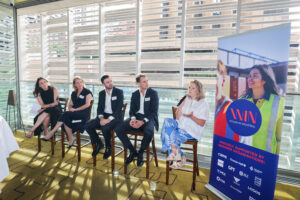
Marketing and brand growth
Our marketing subcommittee focused on amplifying WIN’s voice to strengthen our brand awareness and expand our community across the industrial and logistics property sector.
The goal was simple: show up clearly, consistently and credibly – wherever the industry is.
Over the year, we:
- Welcomed four new member organisations – ISPT, Greystar, Mirvac and AsheMorgan.
- Migrated our database to HubSpot, enabling smarter communications, better engagement tracking and stronger cross-committee support.
- Continued to grow our digital footprint, with steady increases in LinkedIn followers, content engagement rates and website traffic.
- Wrote thought leadership pieces in partnership with industry experts, sharing real-life insight and relevant advice.
- Developed a fresh newsletter template and content ready to launch in Q1 2026.
- Kicked off a full website audit to guide an overhaul and revitalisation later this year.
What stood out:
- Our activation at Bond University’s career expo was a valuable learning curve. It reinforced the impact of clear messaging, eye-catching collateral and confident, well-prepared presenters.
- WIN’s presence at the Property Council’s Industrial Outlook event in Sydney and the FuturePlace Industrial Summit delivered strong visibility – and reinforced our position as a trusted sector voice.
What we learned:
Consistency builds credibility.
When our message is sharp, our materials aligned and our people confident, WIN cuts through. We also saw firsthand how the right systems and tools can unlock better engagement and collaboration across the organisation.
What’s next:
In 2026, expect a more refined marketing toolkit, stronger event activations and even clearer storytelling across every WIN touchpoint – all designed to encourage engagement and ensure impact at scale.
Keen to thrive in industrial? Follow WIN on LinkedIn to hear about our initiatives for professionals and students.
Industrial in 2026: What’s rising, cooling and changing
Australia’s industrial and logistics sector is heading into a defining year. After cycles of rent spikes, construction swings and shifting occupier needs, 2026 is emerging as a pivotal moment. One where clarity returns and strategy takes the lead.
Drawing on insights from Cushman & Wakefield, Knight Frank and CBRE, we’ve pulled together the seven trends that will set the pace and opportunities for the year ahead.
1. Leasing demand will improve as certainty returns
After a cautious 2025, occupiers are getting active again. Business sentiment is lifting, enquiries are up, and there’s finally more clarity around what’s available – and what’s worth chasing.
The fundamentals haven’t changed. E-commerce, 3PLs, data centres and urban logistics are still fuelling demand across the Eastern Seaboard, where well-located space remains hard to come by.
And with consumer spending bouncing back from last year’s lows, transport and logistics operators are more confident about making leasing decisions again. Nationally, we’re looking at close to 2 million square metres of space being leased in 2026. That’s a big jump from the quiet year we’ve just had.
2. Flight to quality will take centre stage
Almost 70% of all 2025 leased floorspace has been prime-grade – which is well above the long-term average. This tells us occupiers aren’t just upgrading for the sake of it. They’re choosing smarter buildings that can help them boost efficiency, cut costs and future-proof supply chains.
The tightest competition is in Sydney and Melbourne’s prime infill precincts. So when something good hits the market in these pockets – where space is scarce and every operational advantage counts – it moves fast.
And as land becomes harder to secure across the Eastern Seaboard, businesses are looking for facilities that give them more. This means automation-ready warehouses, specialised layouts and energy-efficient upgrades are becoming must-haves, not nice-to-haves.
A sector to watch? Cold storage.
Large corporates are upgrading fast, because older facilities no longer meet today’s energy efficiency and sustainability standards. And with new and refurbished spaces struggling to keep up with demand, upgraded cold storage is now achieving $350+ per sqm net – a clear sign of just how strong demand is.
3. Tight supply will push more projects into pre-commitments
With land prices still high and construction costs sticking around, developers are thinking twice about which projects to kick off – and which ones to delay.
The numbers say it all:
- Nearly 900,000 sqm of planned supply has already been pushed past 2027.
- Another 2.4 million sqm won’t move unless pre-commitments are locked in.
- Only two-thirds of the 2026 pipeline is actually underway or pre-leased.
It’s no surprise then that most new buildings in 2026 will be pre-committed or build-to-suit – projects designed around tenants from day one, rather than speculative builds hoping to find a tenant later.
We’ll also see more activity shift to the outer precincts, including Melbourne’s West and North and Sydney’s Outer West as that’s where the limited developable industrial land is located.
4. Vacancy will peak (briefly) before falling again
Vacancy is expected to hit its high point in early to mid-2026 – just under 4% – before tightening again as new supply slows. So yes, there’ll be a little more choice in the short term. But it won’t last long.
Importantly, that choice won’t be evenly spread. Areas that have delivered a lot of new stock, especially outer-ring estates, will take longer to rebalance.
On the other hand, established infill markets – like Sydney’s South, Melbourne’s South East and East, and Brisbane’s Trade Coast and Inner North – should hold their ground, thanks to tighter supply and steady demand.
5. Rental growth will split into two speeds
The days of across-the-board rent jumps are behind us. In 2026, rental growth will move at two speeds, with some precincts pulling ahead and others easing off.
In short, expect the gap between the strongest and weakest precincts to stretch up to 10% over the next five years.
Here’s what’s driving the split:
- Incentives will peak in 2026, giving occupiers a short window to secure sharper deals before they tighten again.
- Tight, established infill locations will continue to outperform, while newer estates work through their recent wave of supply.
And for tenants still on pre-2021 leases: renewing or relocating will mean steeper rent increases – simply because the market has shifted so significantly.
6. Investors will double down on industrial
Industrial is still the sector investors trust most. And its steady income and long-term demand are drawing more capital back into the market.
Even as retail and office become more competitively priced, offshore investors are still targeting Australian logistics, showing just how resilient the sector is.
A few big themes are shaping 2026:
- Interest is spreading beyond Melbourne and Sydney to Brisbane and Adelaide.
- Appetite is strong for data centres, cold storage and automation-ready facilities.
- Investors are sharpening their focus on rent reversion in well-located, undersupplied infill markets.
In short, investors will put their money where demand is strongest and supply is tightest.
7. On-shoring will move from ambition to action
After years of talk, on-shoring is finally expected to gain real traction in 2026. A mix of policy support, global trade uncertainty and election-driven geopolitics is pushing more businesses to rethink what they produce locally – and why.
The sectors most likely to lead the shift include:
- Advanced manufacturing
- Green energy
- Critical technologies
- Meditech, life sciences and defence industries
Federal incentives like the $15 billion National Reconstruction Fund are also giving companies a stronger reason to invest onshore.
What does this mean? As local production ramps up, we’ll see growing demand for high-spec, automated and energy-efficient industrial facilities.
BONUS trend: Industrial outdoor storage (IOS) will grow up
IOS is already moving from a stopgap solution to a fully-fledged investment class. And that trend is only set to grow in 2026.
Sites that were once held for future development are now being repurposed into secure, high-load, tech-enabled storage spaces – from container yards to vehicle storage to transitional infrastructure.
Tenants are willing to pay for power, connectivity and site upgrades. And investors are taking notice, viewing IOS as a strategic, flexible and resilient option in land-tight markets.
Put simply, IOS is maturing into a smart, scalable asset class of its own – one that will continue to support industrial growth well beyond 2026.
2026 is the moment to think sharper and move smarter. And for women in industrial and logistics, it means more room to lead, influence and drive change.
To keep up, follow WIN on LinkedIn.
The key industrial events you must have on your radar
Industrial events are where careers accelerate. They’re where trends emerge, major players connect, and future ideas and opportunities are born. Often before they hit the market.
Being at the right event allows you to network. Stay informed. And boost your on-the-ground smarts.
So where should you start? Here’s a list of standout industrial events making waves across the sector.
The Urban Developer Industrial & Logistics Summit
First on our list: The Urban Developer’s Industrial & Logistics Summit.
Think of this as the holy grail of industrial intel.
This is where you’ll hear what’s happening with land supply, capital flows, leasing trends, funding partnerships and the next generation of assets – before it hits the mainstream.
You’ll walk away with a sharper read on where the market is heading, how top investors and developers are positioning themselves and what’s really happening with land access and capital pressure.
And yes, it goes deeper than anything you’ll find scrolling LinkedIn.
Who it’s for:
Anyone building, funding, owning or occupying industrial space. You could be a developer, investor, project manager or adviser.
Find out more at The Urban Developer.
Industrial Real Estate Summit
If you’re looking for the fullest possible read on the Australian industrial market, this is it.
The Industrial Real Estate Summit is one of the country’s biggest and most influential gatherings of developers, owners, investors and capital markets.
The summit digs into what’s driving movement in ecommerce, supply chains and logistics.
So, expect conversations on diverse topics from land supply and asset evolution to sustainability, tenant expectations and innovation.
Speakers often include leaders from ESR, GPT Group, Cushman & Wakefield and other major industrial players.
Who it’s for:
Senior decision-makers across development, investment, asset management, logistics, design, construction, capital and advisory.
Find out more about the Industrial Real Estate Summit.
Property Council Australia – Western Sydney Outlook
Western Sydney is on the cusp of significant transformation. With a new airport in place and industrial land rapidly moving, the region is entering a pivotal phase of economic and housing growth.
And this event is where senior decision-makers come together to unpack what’s shifting beneath the surface.
Expect talk on how investment is moving, where policy needs to accelerate and how industry, education and government can align to deliver better results.
Speakers typically include influential voices who are actively shaping the future of the region.
Who it’s for:
Anyone with a strategic stake in Western Sydney: developers, investors, planners, infrastructure leaders and policy professionals.
Find out more about the Western Sydney Outlook.
Property Council Australia – NSW Industrial & Logistics Outlook
New South Wales continues to set the national pace – and this event digs into the why and how.
There will be discourse around investment behaviour, policy shifts and where developers are moving. But also, why they’re choosing New South Wales over other states.
Expect high-level yet grounded discussions, led by senior economists from top banks and executives in logistics, finance and development.
Who it’s for:
Developers, investors, logistics and capital leaders who want to stay ahead of what’s shaping NSW – not just react to it.
Find out more about the NSW Industrial & Logistics Outlook.
Property Council Australia – VIC Industrial Outlook
Like Sydney, Victoria’s industrial market is moving fast.
The Property Council of Australia’s VIC Industrial Outlook brings the people who are steering that change into one room.
At this event, expect a panel of directors, senior managers and executives to unpack what’s shifting. Key topics normally cover land competition, infrastructure pressure, economic policy and more.
Conversations will also dive into live market forces. Think: data centres, AI automation, freight network constraints, and the reforms needed to keep Victoria competitive.
Who it’s for:
Anyone driving industrial strategy across Victoria: developers, investors, infrastructure leaders, logistics groups and policy decision-makers.
Find out more about the VIC Industrial Outlook.
Want to stay ahead of where industrial is heading? Follow WIN on LinkedIn for conversations you won’t find anywhere else.
Time to own it: Turning performance reviews into strategic career moves
Performance reviews. A time to revisit the past year, measure your contribution, and – inevitably – face some nerves along the way.
But it doesn’t have to be that way.
What if your performance review became less of a feedback session – and more of a strategic checkpoint in your career journey?
We spoke with Sharon Woodley, HR consultant specialising in the property industry and CliftonStrengths coach, to unpack how women in industrial can take control of the process and use it to drive growth.

Sharon Woodley
First, reframe the review
To make performance reviews work for you, start by shifting your mindset. See them as opportunities to plan what’s next, rather than just meetings where you passively receive feedback.
‘We need to shift from performance reviews to performance development,’ says Sharon Woodley, Consultant Chief People Officer at Paxton Consulting Group.
‘Bring your career aspirations into the room. Learn to say “This is the value I bring today, and here’s where I want to grow next.”’
But that’s easier said than done, especially for women. Sharon has seen many hold back in reviews, often due to:
- Undervaluing their achievements or assuming their work will speak for itself
- Fearing they’ll be seen as pushy when self-advocating
- Over-relying on softer strengths, which can make it harder to build a strong case
But the truth is, advocating for yourself isn’t arrogance – it’s taking ownership of your career.
So go in ready to talk about your goals. Help your manager see how your strengths, contributions and potential fit into the bigger picture. Whether you’re aiming for more responsibility, a career shift or a future leadership role, be bold and make it known.
Ditch the task list and focus on impact
Listing everything you’ve done won’t get you promoted. But showing how your work drives business outcomes will.
‘Women often focus on tasks,’ says Sharon. ‘But performance reviews are about showing your impact.’
What does that mean? Well, instead of saying:
I managed the reports and completed three major projects.
Try:
My reporting reduced processing delays by 20%. That helped the team hit our Q2 target ahead of time.
In the industrial property sector, reviews often skew heavily toward technical outputs. That’s why it’s especially important to translate ‘softer’ strengths – like communication or collaboration – into business language.
‘In male-dominated settings, it’s even more important to own your contributions and make sure your unique strengths are visible,’ Sharon adds.
So yes, bring the list of what you’ve completed and achieved. But back it up with examples, metrics or even feedback from colleagues and clients to show how you’ve contributed to the bigger business outcomes.
Because that’s what gets noticed.
Show self-awareness and a readiness to grow
You don’t have to walk into the room flawless. Because perfection isn’t the goal – growth is.
Instead, walk in with self-awareness.
Sharon encourages women to openly and confidently reflect on their strengths and blind spots. That shows maturity, agility and coachability – all signs of future potential, including leadership.
‘It’s powerful to say, “I know I can be overly task-focused when under pressure – but here’s how I’m working on it.”’ she says.
‘That shows growth. That shows readiness.’
She adds that promotions go to those who demonstrate performance and potential. So don’t stop at what you’ve done. Show where you’re headed – and how you’re getting there.
Prepare your pitch – early
Your performance review is not the time to ‘wing it’.
Start preparing early by:
- Reflecting on your achievements, especially those with team or business impact
- Collecting data, feedback and examples
- Revisiting your career goals
- Getting clear on what you want from the conversation
‘Preparation is everything,’ Sharon stresses. ‘Give yourself time to reflect. Go through your calendar and emails and check what’s happened over the past year. Don’t just focus on what happened last week.’
And don’t forget your manager needs time too.
Submit your documentation at least three working days in advance so they have time to digest it and have a more meaningful conversation with you.
Be clear and confident about what you want
Promotion? Pay rise? More flexibility? This is your moment to ask – not wait for someone else to raise it.
Not sure how to frame it? Here are Sharon’s tips:
- Start with value, not entitlement: Say, Here’s the business impact I’ve delivered, and here’s where I can add even more value.
- Use a ‘strengths lens’: Say, My drive and strategic thinking have helped me consistently deliver X. In a larger role, here’s how I’d scale that.
- Frame it as a partnership: Instead of I want…, go with Here’s what I bring, here’s what’s next, and here’s how I see my role evolving.
In some companies, performance and pay discussions are separate. If that’s the case, you can ask, ‘When would be the right time to talk about remuneration?’
And if things don’t go the way you want?
‘Be prepared for that, so you can balance your emotions,’ says Sharon. ‘Then ask for specifics and build a plan around what you need to work on to be ready.’
Stay curious – not defensive
Not all feedback will feel good. And that’s okay. Keep in mind that you don’t have to resolve everything in the moment.
‘If something hits hard, it’s okay to pause,’ Sharon says. ‘Tell your manager, “Thanks for the feedback, I’d like some time to process it. Can we follow up in a few days?”’
What if the feedback feels too generic, broad or vague? Ask for clarity.
‘Ask for examples,’ Sharon advises. ‘Ask where things are working. Ask what success would look like from your manager’s perspective.
‘Make it a two-way discussion, so it’s not just a one-way download.’
Final tip: Don’t go it alone
There’s no weakness in feeling nervous – or in seeking support.
If you’re unsure how to handle your upcoming review, talk to other women.
As Sharon puts it: ‘Get advice from someone you admire. Someone who speaks up, owns their value and asks for what they want.’
Remind yourself that performance reviews aren’t a test to pass or fail. They’re your chance to take hold of your career, show your value and shape what’s next.
So when the next one lands in your calendar, don’t shrink back.
Prepare with purpose – and own it.
Want more expert insights to thrive, lead and grow in the industrial sector? Follow Women in Industrial on LinkedIn.
Roadmaps 101: WIN’s secret to driving real change
In just 9 years, WIN has grown from a small, passionate team into a leading voice for women in industrial.
But this growth didn’t happen by chance. It took dedication, determination – and a clear roadmap.
Every year, our committee members come together for a planning session to set bold goals and strategic plans. And the results have been impressive.
Here’s a glimpse into our planning process – and how it drives WIN’s progress.
But first, what is a roadmap?
Success (in anything) doesn’t happen overnight. And when you have a goal as big as breaking barriers in a male-dominated industry, you need a solid plan.
Enter the roadmap.
At its core, a roadmap is a strategic document that helps organisations visualise where they want to be within a specific timeframe. It puts priorities front and centre – and gives you a clear path to your goals.
For WIN, the humble roadmap has become a central part of our progress.
As WIN founding member Charlotte Brabant puts it: ‘We’ve always had big ambitions. But as we grew, we knew we needed more solid structure to support us in getting to where we desire to be.’
And that support came in the form of roadmap consultant, Glen McKernan.
A glimpse into our process
Since 2022, we’ve been teaming up with Glen to hold our annual WIN strategy day – a powerful session that allows our committee to refine priorities, set goals and track progress. And all our committee members get to have a say.
‘When I first met with WIN’s committee members, I was impressed that they already had their vision set – which is half the battle done,’ Glen shares.
‘With that in place, WIN’s roadmap sessions are highly focused,’ he adds. ‘We spend a few hours setting priorities, and everyone walks away knowing exactly what they’re responsible for.’
Every year, WIN’s roadmap is built around 4 core pillars:
- Networking and professional development
- Marketing and brand presence
- Education and industry engagement
- Operational growth, governance and internal systems
These focus areas shape the initiatives we take on, like launching new mentorship programs or increasing industry partnerships.
‘Think of WIN’s roadmap as a four-lane highway,’ Glen explains. ‘Each lane feeds into the ultimate destination of empowering women in industrial – with actionable steps.’
The entire process is highly collaborative and begins long before strategy day, with committee members sharing their insights in a pre-session survey.
And on the day, everyone gets a vote on key initiatives, priorities and goals to tackle.
The wins from our roadmaps so far
Since introducing roadmaps to our strategy, we’ve made huge strides in education, advocacy and strengthening our network.
Charlotte lists our achievements: ‘We’re forming strong relationships with universities and property groups. We’re launching scholarships and creating pathways for students. And we’re expanding our following and network.
‘This has all been a direct result of the focus our annual roadmap provides,’ she stresses.
Let’s look at those achievements in more detail. In the past few years, we’ve:
- Strengthened partnerships with key organisations like the Property Council of Australia
- Inspired young women to explore careers in industrial by expanding our university and high school outreach
- Launched scholarship and mentorship programs to help women enter the sector or progress their careers
- Fostered stronger connections and deeper learning by shifting to intimate, education-focused networking events
- Created an operations and systems subcommittee to streamline event planning, membership management and marketing
- Established WIN as a leader in our sector through the publication of thought leadership pieces
Looking back – while always moving forward
One of the best parts of WIN’s roadmap planning sessions? Having the opportunity to reflect on and celebrate our growth – and adapt our next roadmap accordingly.
As Glen puts it: ‘The best roadmaps shift as an organisation changes its goals – and that’s exactly what WIN does.’
It’s this mindset that’s helped shape the WIN we see today.
‘Seeing how far we’ve come makes me enormously proud,’ Charlotte says. ‘WIN has become a well-known name in the Australian industrial sector. We’re respected in the industry. And we’re making a real impact.’
And the best part? We’re just getting started.
Ready to help shape WIN’s next chapter?
If you’re a WIN member who thrives on action, insight and impact, we’d love to have you at the table. Reach out to one of our committee members today.
How the WIN x PCA scholarship is helping women thrive in industrial
Earlier this year, WIN joined forces with the Property Council of Australia (PCA) to offer scholarships for PCA Industrial and Supply Chain courses.
The goal? To back women with the tools, knowledge and support to grow their careers.
With the program now in full swing, we checked in with three recipients – Caitlyne Parnis, Alice Logan Edwards and Roopika Ramlackhan – to learn how the experience is shaping the way they show up in the industry.

Caitlyne Parnis – Cushman & Wakefield
As an Executive in Cushman & Wakefield’s Brokerage Industrial and Logistics team, Caitlyne Parnis is all about bringing something different to the table.
So when the opportunity to apply for a PCA scholarship hit her inbox, she didn’t hesitate.
‘I’m always looking to grow and find new ways to add value as an agent,’ she explains. ‘And this was a great opportunity to broaden my perspective and shift how I approach my work.’
Caitlyne applied and secured the scholarship, landing a spot in the Industrial and Supply Chain Industry Diploma. And it’s been a defining step in her career.
The course sparked a new interest in supply chain strategy. It also boosted her confidence and helped her tailor her approach to every client.
Now, she’s asking sharper questions, thinking more strategically and feeling more grounded in every conversation.
One of Caitlyne’s biggest takeaways? Just how broad the supply chain ecosystem really is.
‘I hadn’t fully realised how much industrial property decisions can impact overall supply chain performance,’ she explains. ‘The course has helped me see my role in a completely new light.’
Caitlyne’s advice to other women in the sector? Lean into your network.
‘Don’t feel like you have to figure it all out alone, and don’t be afraid to reach out to others,’ she says.
‘Whether it’s your team, mentors, peers or organisations like WIN – surround yourself with people who lift you up. It makes a big difference.’
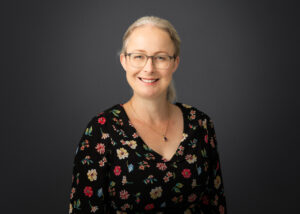
Alice Logan Edwards – The GPT Group
Like Caitlyne, Alice Logan Edwards saw the PCA scholarship as an opportunity she couldn’t miss.
As a Property Manager at The GPT Group, she was ready to take the next step in her career – and she knew this course could help her get there.
‘I wanted to move deeper into the supply chain space,’ she says. ‘And what better way to learn than directly from the people leading the industry?’
What’s stood out most? The real-world relevance.
‘The course isn’t just theory – it’s written by people who are working in the industry. You’re getting current, practical insights you can apply immediately.’
But the biggest win for Alice has been the connections.
‘This scholarship has opened invaluable doors to networking. And the people I’ve met have been so willing to share their experience and insights,’ she says. ‘It’s helped me grow my confidence and expand my perspective in ways I didn’t expect.’
She’s also grateful for the backing that made it all possible.
‘I wouldn’t have been able to take on the diploma without WIN’s support,’ she says. ‘It means a lot to know there are people out there who genuinely want to see women succeed in this industry.’
Alice has one piece of advice to others thinking about taking the leap: ‘Stay curious. It’s never too late to learn.’

Roopika Ramlackhan – Charter Hall
For Roopika Ramlackhan, the WIN x PCA scholarship was a chance to dive deeper into her sector – and connect with others shaping its future.
‘I saw it as a great opportunity to gain more insight into our industry and build connections with peers,’ says Roopika, a Senior Property Manager at Charter Hall.
Now, midway through the diploma, she’s already seeing shifts in the way she works.
Roopika explains, ‘One of my biggest takeaways so far is that collaboration is key – and asking questions isn’t a weakness. It’s how you truly understand your client’s needs.’
The scholarship has also sharpened Roopika’s career path.
‘It’s been a real stepping stone,’ she says. ‘It’s helped me strengthen my skills and see how I can add more value to the business overall.’
Now, Roopika is keen to share this message with others navigating the industry: ‘Back yourself. Say yes to opportunities – even if they feel a bit outside your comfort zone. Because confidence grows through action.’
Curious about future scholarship opportunities or ready to join a network of women driving real change in industrial?
Follow WIN on LinkedIn to stay in the loop.
The 5 game-changing projects reshaping industrial right now
Big ambition. Smarter design. And WIN partners behind the build. These are the common factors behind five of the hottest industrial projects in Australia right now.
From low-carbon builds to omnichannel hubs, discover how these standout developments are redefining what high-performance industrial looks like.

1. Kmart’s $200 million Omnichannel Fulfilment Centre in Moorebank
Location: Moorebank Intermodal Precinct, NSW
WIN partner: TMX Transform
Retail logistics is getting a serious upgrade.
Kmart Group is investing in a new 100,000 sqm Omnichannel Fulfilment Centre at Moorebank to support the growth of both Kmart and Target across NSW.
Key features include:
- Direct rail-to-dock operation to remove trucks from the road and streamline container handling.
- Ability to see over 200 outbound semi-trailer movements per day at peak, enabling rapid fulfilment across NSW stores.
- A high-level gantry walkway allowing staff to move safely between the main office, central control tower and operational workfaces.
Designed to boost speed, flexibility and efficiency, the facility will modernise operations and scale supply chain capacity. It’s set to go live in late 2027.
As project management partner, TMX Transform is bringing deep expertise in supply chain infrastructure to this transformative development.
The result? A smarter, faster distribution model – and a new benchmark for tech-enabled retail logistics.
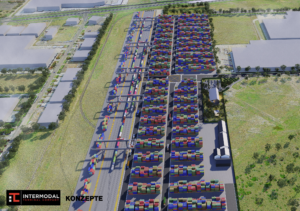
2. The Melbourne Intermodal Terminal in Somerton
Location: Somerton, VIC
WIN partner: Knight Frank
Tipped to be Australia’s largest intermodal terminal, the Melbourne Intermodal Terminal (MIT) Somerton is designed to help ease pressure on supply chains and lift freight efficiency nationwide.
Backed by a $400 million investment and owned by Aware Super, this 45-hectare open-access bonded facility is already under construction. Operations are expected to begin by October 2025.
Featuring 30 hectares of concrete hardstand, MIT is purpose-built to handle high-volume freight with unmatched durability and efficiency.
Its strategic location offers direct rail access to key national freight corridors – linking Melbourne’s Port with Brisbane, Sydney, Adelaide and Perth. It also enhances connectivity to the newly branded Melbourne Intermodal & Industrial Exchange (MIIX), a 99-hectare adjoining Industrial Estate.
As the first signature site for Intermodal Terminal Company (ITC), MIT will streamline freight flows, unlock new capacity – and drive a smarter, greener and more connected national supply chain supporting Victoria’s logistics ecosystem.

3. Realterm’s Industrial Outdoor Storage facility in Chipping Norton
Location: Chipping Norton, NSW
WIN partner: Realterm
Container capacity is under pressure – and Realterm is answering the call for help.
Its latest project? A 23,000 sqm Industrial Outdoor Storage (IOS) facility in one of Sydney’s most in-demand logistics corridors, purpose-built to absorb growing freight volumes.
Due for completion in Q1 2026, this site is a standout for two key reasons:
- Serious scale: Capacity for 1,700 empty and fully laden shipping containers across the 125-tonne-rated hardstand.
- First of its kind: The first speculative IOS facility developed outside of Australia’s ports and intermodals precincts.
With 24/7 operation, located minutes from Moorebank Intermodal and with direct access to the M5 and M7 corridors, this facility is tailor-made for transport, freight and third-party logistics operators.
This is a bold and strategic response to the growing demand for high-volume freight infrastructure, and a move that shows confidence in Sydney’s logistics future. It also reflects Realterm’s commitment to staying ahead of the curve and delivering investments that keep the world moving.
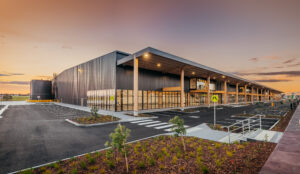
4. Goodman’s Canopy at Chifley
Location: Moorabbin Airport, VIC
WIN partner: Goodman
Sustainability isn’t seen as a bonus anymore – it’s the baseline. And Goodman’s Canopy at Chifley shows what’s possible when environmental intelligence is built in from the ground up.
Completed in 2025, this is Goodman’s first development built primarily from timber, reducing embodied carbon emissions by approximately 24% compared to a similar steel-built facility.
Key features include:
- 400kW rooftop solar
- Targeting a 5 Star Green Star Design & As Built Rating
- Smart metering and EV charging infrastructure
- Flexible warehouse and office layouts
This project balances high performance with environmental impact – and forms part of Goodman’s broader strategy to deliver low-carbon logistics in high-demand urban infill locations.
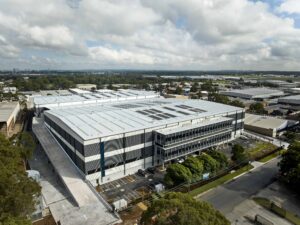
5. Vaughan’s Hale Platform Milperra
Location: Milperra, NSW
WIN partner: Vaughan Constructions
Multi-level industrial design is on the rise. And Hale Platform in Milperra is leading the way.
Delivered by Vaughan Constructions, this 38,000 sqm multi-level facility combines scale, flexibility and efficiency across two warehouse levels and four floors of office space.
Its key features include:
- Flexible tenancies from 2,900 sqm to 10,102 sqm
- 30-metre-wide undercover breezeways
- A ramp system for seamless vehicle access
Sustainability is at the forefront, with rainwater harvesting, PV solar and a target 4 Star Green Star rating.
This project shows how future-facing design looks when done right – optimising space, function and environmental performance, all in one footprint.
Ambitious, strategic and built with longevity in mind, our partners’ projects are redefining what’s possible in industrial.
Want to stay ahead of what’s shaping industrial next? Follow WIN on LinkedIn.
From curiosity to career clarity: How mentorship changed Isabella Anello’s path
Isabella Anello didn’t expect industrial to win her over. But now, it’s all she can think about.
As the first participant in the 2025 WIN x UTS mentorship program, Isabella has just finished placements with our partners CBRE, Knight Frank and Cushman & Wakefield.
She shares how the experience changed her view of the industrial sector. And helped her land her first part-time, undergraduate job.
The step that set things in motion
Isabella (Bella) Anello had never dreamt of a career in industrial. Instead, she had her sights set on capital markets and research.
But while studying for her Bachelor of Property Economics at the University of Technology Sydney (UTS), she came across WIN’s new mentorship program – launched in partnership with UTS – and saw an opportunity worth exploring. One that offered:
- Hands-on experience in leasing, research, marketing and client engagement
- Rotating work placements across leading industrial firms
- A $5,000 grant to support her studies
Bella decided to go for it – and was accepted. That step sparked a turning point in her ambitions.
‘It’s changed my whole perspective,’ Bella says. ‘Not just on industrial, but on how important it is to see more women in this space.’
And she credits the time spent inside three of Australia’s top industrial real estate firms as the key driver behind her shift in mindset and motivation.
Starting strong at CBRE
Bella’s first placement was with CBRE. And from the moment she stepped foot into the global commercial real estate firm, she felt at home.
As one of the biggest players in the industrial space, CBRE delivers everything from leasing services to investment strategy. It could have been overwhelming, but for Bella, it felt surprisingly grounding.
‘It was a great starting point,’ she shares. ‘I didn’t expect a company that big to feel so personal.’
While assigned to the Central West Industrial team, Bella was encouraged to connect with people across all aspects of the business, including tenant reps, valuers and asset managers.
‘I gained a really broad view of the sector,’ she recalls. ‘I loved seeing how it all fit together, and it made the industry feel so much more dynamic than I expected.’
Bella was also grateful for her mentor, CBRE’s Industrial & Logistics Manager Caris Kinsella, who played a key role in shaping the experience.
‘Caris really cared, and every interaction felt intentional. She genuinely wanted me to learn, ask questions and meet the right people,’ Bella says.
It was the perfect launchpad for what came next.
The turning point at Knight Frank
After two weeks at CBRE, it was time for Bella to move to Knight Frank.
There, she received what few students ever get: direct access to the people shaping the future of global real estate. Leaders like Alice Crowley, Director of International Capital, who flew in from Singapore just to meet her.
‘The fact that Alice made the effort to connect with me, face to face… that meant a lot,’ Bella says.
From day one at Knight Frank, Bella was immersed in the business.
She sat in on the company’s quarterly wrap-up of performance, strategy and vision, and even scored a one-on-one conversation with CEO James Patterson.
The rest of her time at Knight Frank was packed with candid career chats, lunches with senior leaders and visits to the CBD, North and Western Sydney offices.
Bella also walked away with one piece of advice that revolutionised her mindset.
‘One of the agents told me that it’s not just about a property – it’s about solving a business problem,’ Bella recalls. ‘That really challenged the way I saw industrial agency, because it’s not just about leasing a space. It’s about finding the right solution for a client to help them achieve their next level of success.’
That understanding completely reframed how she saw the industry – and her place in it.
Clarity and connections at Cushman & Wakefield
Bella’s final stop was Cushman & Wakefield – a global firm known for industrial leasing, capital markets and tenant representation.
By this point, she had found her footing. But this rotation added something new: a front-row seat to how deals are made.
On her very first day, Bella joined an agent’s function in Moorebank, surrounded by professionals from CBRE, Knight Frank and Cushman & Wakefield.
‘It was kind of wild,’ she says. ‘But really fantastic to see how these firms interact, even as competitors.’
What else did Bella do at this placement? Attended a WIN network lunch, toured Sydney’s west and sat in on client meetings with David Hall, Cushman’s National Head of Industrial.
‘I loved being a fly on the wall,’ she admits. ‘It was fascinating to watch how each professional communicated and built trust.’
All these observations further changed Bella’s perception of the sector.
‘I didn’t realise how niche the industrial market is,’ Bella says. ‘It’s often seen as a sector of unglamorous dark sheds – but the women I’ve met in industrial are thriving. And it made me realise how important it is to have more of us participating in it.’
One program, three firms, and a whole new direction
Looking back, Bella says the experience gave her everything a quality mentorship should: exposure, connections and above all – confidence.
It also helped her pinpoint what truly drives her: client-facing work, outcome-driven projects and building strong relationships.
Before the program, industrial agency wasn’t even on Bella’s radar. Now? She’s stepping into a brand-new role at an Australian infill logistics development and fund management firm, Hale – thanks to the connections made during the mentorship.
Her advice to students considering the mentorship program?
‘Do it,’ she says. ‘You won’t just shadow – you’ll be supported and taken seriously.
‘I’d do it all again in a heartbeat!’
Keen to start your career in industrial? Follow WIN on LinkedIn to hear about upcoming mentorship and work placement opportunities.
R U OK? Why mental health conversations matter in industrial
Long shifts. Isolated roles. Physically demanding work.
It’s no secret that life in industrial can be tough. And mental health is one of the biggest safety risks facing professionals in the sector – especially women.
But in many workplaces, there’s still stigma around speaking up. That’s why the recent R U OK? in Trucks & Sheds National Day of Action event struck a chord.
We spoke to Naomi Frauenfelder, Chief Executive of Healthy Heads in Trucks and Sheds, on why normalising mental health conversations can change the game.
Sobering stats of mental health
Mental health is often overlooked across the industrial sector. But it’s definitely a growing concern.
According to Safe Work Australia, mental health conditions now account for 9% of serious workers’ compensation claims – almost double what they were a decade ago.
And 48% of workers across transport, postal and warehousing who experienced a mental health condition said their workplace caused it or made it worse.
These are sobering statistics. And while both men and women are affected, women can be even more so.
‘Women can face additional pressures that may contribute to greater mental health challenges,’ says Naomi Frauenfelder, Chief Executive of Healthy Heads in Trucks and Sheds.
‘Some women deal with outdated perceptions that industrial is a “man’s job”. Key infrastructure often reflects this, as one of the main issues we hear about again and again is the absence of women’s bathrooms and showers at heavy vehicle rest areas. This means women need to use men’s facilities, which some may not feel safe to do.’
Healthy Heads in Trucks and Sheds is a not-for-profit helping businesses and individuals across the sector create safer, more mentally supportive workplaces.
And this year, they once again teamed up with R U OK? to lead the R U OK? in Trucks & Sheds National Day of Action event.
‘This campaign provides people in industry with the tools and confidence to spot the signs a workmate might be struggling – and to ask their workmates how they really are,’ Naomi says.
‘It’s not about fixing their problems; it’s about showing that you care.’
You don’t need to be an expert to care
This year’s campaign theme was R U OK? – No qualifications needed. And it cuts straight to the heart of what stops so many from checking in: the fear of getting it wrong.
But the truth is, you don’t need to be a psychologist to ask someone how they’re doing. And you don’t need to have all the answers or say the perfect thing.
You just need to be brave enough to start a conversation.
Naomi explains: ‘By having regular, meaningful conversations about life’s ups and downs, you can help the people in your world feel supported – and encourage them to get professional help before things escalate.’
In busy environments, these conversations might happen on the back of a truck, during a break or even while locking up a warehouse.
They might be quick. They might feel awkward. But they matter.
And it’s often in such small, human moments that someone who is struggling might finally feel safe enough to speak up.
‘A conversation could change a life,’ Naomi stresses. ‘And we all have what it takes to ask, “are you okay?”’
How leaders – and colleagues – can step up
When it comes to mental health, culture is built from the ground up.
And everyone has a role to play – from CEOs to contractors.
But how do you start the conversation? How do you approach it without making things uncomfortable? And what’s the best way to check in with someone at work?
For leaders, you can start by:
- Creating an open and supportive environment where conversations about mental health are normalised
- Providing access to helpful tools like the Healthy Heads App, which offers digital mental health support
- Ensuring teams are equipped with mental health training so everyone knows how to look after themselves and support others
For workers, small actions can make a big difference:
- Learn the signs of mental health distress, and have the confidence to ask R U OK?
- Use the ALEC acronym to guide conversations:
- Ask how they’re going
- Listen without judgment
- Encourage action to seek support
- Check in later to show you care
Support doesn’t need to be perfect – it just needs to be there.
Keeping the conversation going
Every industrial workplace has the potential to become a space where mental health is valued and conversations are normalised.
That’s why R U OK? in Trucks & Sheds is a powerful event. Because it serves up the reminder that looking out for each other shouldn’t just happen once a year.
‘It sets an example for others to follow, as well as helping to create a culture where employees feel safe and empowered,’ Naomi says.
This year, we were proud to see a couple of our WIN partner organisations participating in the R U OK? in Trucks & Sheds initiative:
- ESR Australia & NZ hosted breakfast events and started meaningful conversations over coffee nationally.
- GPT delivered hundreds of cupcakes and shared resources with their customers.
- Charter Hall hosted a BBQ lunch for the CEVA team in Queensland, with guest speakers from R U OK and Healthy Heads.
The tools are here. Support is growing. And this movement is reaching more sites, teams and individuals than ever before.
Together, we’re building safer, stronger, more human workplaces.
Access free resources, posters, conversation guides and more via the R U OK? in Trucks and Sheds Toolkit.
Want more inspiring stories about industrial? Follow WIN on LinkedIn for insights and updates.




